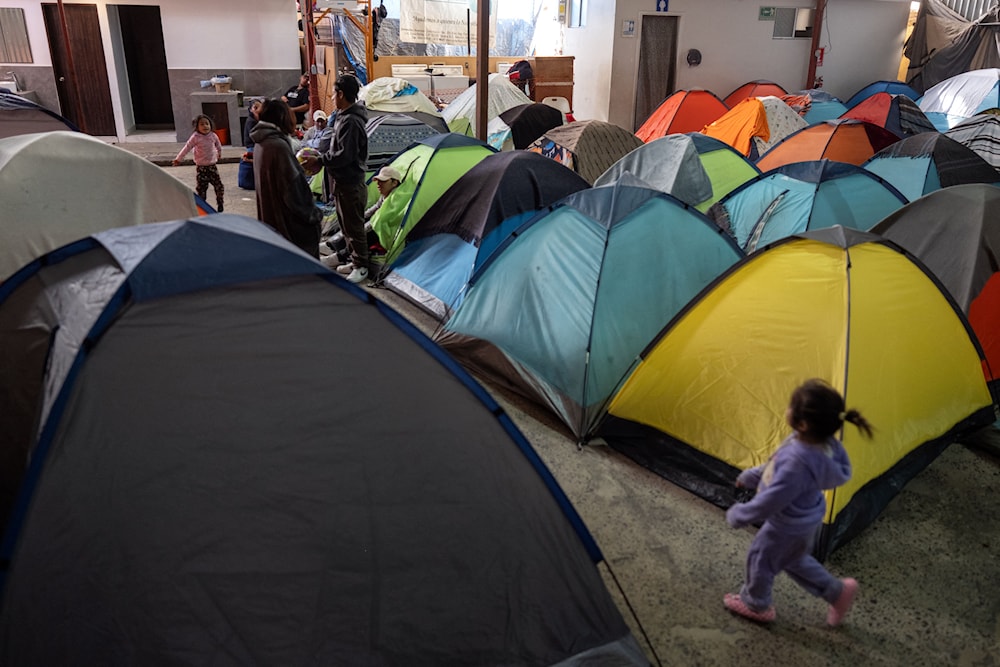US judge suspends Trump’s order on ending birthright citizenship
US District Judge John Coughenour granted the injunction at the request of four Democratic-led states.
-

Asylum seekers camp at Juventud 2000 migrant shelter in Tijuana, Baja California state, Mexico, on January 21, 2025. (AFP)
A federal judge in Seattle issued a temporary restraining order on Thursday, blocking President Donald Trump's administration from implementing an executive order that sought to curtail automatic birthright citizenship in the United States, deeming the measure "blatantly unconstitutional".
US District Judge John Coughenour granted the injunction at the request of four Democratic-led states. The order, signed by Trump on his first day in office, had already sparked five lawsuits from civil rights organizations and Democratic attorney generals representing 22 states, who argue that it flagrantly violates the US Constitution.
"Under this order, babies being born today don’t count as US citizens," said Lane Polozola, Washington State’s assistant attorney general, during a hearing before Judge Coughenour in Seattle.
Polozola, representing the Democratic attorneys general of Washington, Arizona, Illinois, and Oregon, urged the judge to act swiftly to block the enforcement of what they described as a cornerstone of Trump’s immigration crackdown.
After the ruling, Polozola addressed reporters outside the courtroom, saying, "This is step one but to hear the judge from the bench say that in his 40 years as a judge, he has never seen something so blatantly unconstitutional, sets the tone for the seriousness of this effort."
The challengers assert that Trump’s executive order directly contradicts the citizenship clause of the 14th Amendment, which guarantees that anyone born on US soil is a citizen. The order directed federal agencies to deny citizenship to children born in the US if neither parent is a citizen or lawful permanent resident.
In a legal brief filed on Wednesday night, the US Department of Justice defended the order, calling it an "integral part" of the president’s strategy "to address this nation’s broken immigration system and the ongoing crisis at the southern border."
The lawsuit in Seattle, moving more rapidly than the four other cases challenging the executive order, was assigned to Judge Coughenour, a Republican appointee of President Ronald Reagan. The judge could issue a bench ruling after hearing arguments or choose to deliberate further before issuing a decision.
If enforced, Trump’s order would deny citizenship to children born after February 19 whose parents are neither citizens nor lawful permanent residents. Such children would face deportation and be ineligible for Social Security numbers, government benefits, and lawful employment as they grow older. Democratic-led states estimate that the policy would strip citizenship from more than 150,000 newborns annually.
The states challenging the order argue that the 14th Amendment’s citizenship clause, adopted in 1868 after the Civil War, was clearly established 127 years ago by the US Supreme Court in the case of United States v. Wong Kim Ark. That decision affirmed that children born in the US to non-citizen parents are entitled to citizenship. The 14th Amendment also overturned the infamous 1857 Dred Scott ruling, which denied constitutional protections to enslaved Black people.
However, the Justice Department argued Wednesday in its brief that the 14th Amendment does not guarantee universal birthright citizenship, claiming that the Wong Kim Ark ruling only applied to children of permanent residents. The department also contended that the case by the states "flunks multiple threshold hurdles" and that such claims under the citizenship clause must be pursued by individuals, not states.
In a separate development, 36 Republican members of the US House of Representatives introduced legislation on Tuesday to limit automatic citizenship to children born to US citizens or lawful permanent residents.
Read more: Newark mayor slams warrantless immigration raid as 'terrorizing'

 4 Min Read
4 Min Read








